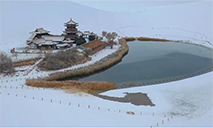A new Cold War would be a disaster for the scientific cooperation we need
In our common planet we face enormous challenges.
The climate, oceans and biodiversity are rapidly and visibly deteriorating, threatening the sustainability of the farms and fisheries on which all depend. Large scale forced migration due to climate problems will increase. Many fast growing cities do not have enough clean water. There is an ever-present threat of new epidemic disease.
In an interconnected world these are totally shared problems. The Covid-19 global pandemic has shown dramatically that what happens in each country can affect every other.
Nations can no longer flourish on their own because the shared world itself is in danger. Understanding this crucial fact, ‘thinking through the world’ (Zhao Tingyang’s idea of tianxia), is the way forward for all of us. We must work together, across the different traditions, languages and political systems, on the basis of dialogue between civilisations.
Respectful cooperation is based on unity in diversity (heer butong), rather than expecting others to be the same as ourselves. No single country or single thinking has all the answers.
Two kinds of cooperation are available to us. One is the international geo-political order of nations. The other is sharing and cooperation in science and technology.
The last two decades have seen exceptional scientific collaboration between universities, academies and research institutes. One global science paper in every four has international co-authors. Open data sharing greatly speeded Covid-19 vaccines, saving millions of lives.
China makes a great contribution to human knowledge. Along with the EU and North America it is one of three great zones of world science. Tsinghua is the world’s leading university in total high citation science in the combined fields of mathematics, computing, engineering, materials and physical sciences. It is ahead of MIT.
In 2018, scientists from China co-authored 55,382 papers with those in the United States, much the largest nation-to-nation sharing, and collaborated extensively in Europe, other English-speaking countries and Asia.
Hence it is unfortunate that tensions in the first kind of international cooperation, the geo-political order, are now affecting science and technology.
Signs of a new Cold War are emerging - though few who lived through the last Cold War want to return to that kind of bitter, prejudiced, divided world. How does pouring resources into military confrontation, no doubt powered by fossil fuels, address the crises of climate, habitat, food, water and health? We are all inter-dependent.
Until recently there was solid support in Europe and America for engaging with China. Now there is pressure on Western researchers, varying by country, to ‘decouple’ with China. There is suspicion and self-censorship.
National interests are inevitable in science and technology. There will always be data not shared. But that should be the exception, not the norm.
It would be disastrous if unnecessary security concerns or a false sense of superiority lead us to stop talking with each other.
In the face of geo-political tensions it is crucial that the fullest possible scientific cooperation is maintained, in both China and the West, on the basis of mutual respect, the careful negotiation of protocols and agreements, and continuing trust.
Differences in policy and approach are inevitable. When ‘thinking through the world’ we learn much in discussing these differences. When the good will is there, mutual solutions are found and all humanity benefits.
The author is Professor of Higher Education at the University of Oxford and Director of the ESRC/OFSRE Centre for Global Higher Education (CGHE).
The opinions expressed in this article reflect those of the author, and do not necessarily reflect those of People's Daily Online.
Photos
Related Stories
Copyright © 2021 People's Daily Online. All Rights Reserved.










